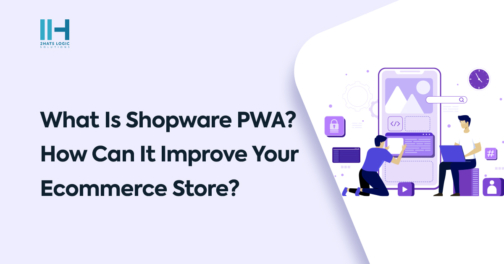Greetings! I'm Aneesh Sreedharan, CEO of 2Hats Logic Solutions. At 2Hats Logic Solutions, we are dedicated to providing technical expertise and resolving your concerns in the world of technology. Our blog page serves as a resource where we share insights and experiences, offering valuable perspectives on your queries.

Progressive Web Apps (PWAs) have changed the way we shop online, blending the best features of web pages and mobile apps. As online shopping becomes more popular, PWAs are becoming a must-have for ecommerce businesses that want to give their customers a great shopping experience.
What are Progressive Web Apps?
A progressive web app (PWA) is a type of mobile app that can be used through a web browser. PWAs combine the features of traditional web apps and mobile apps to provide a fast, reliable, and engaging user experience. PWAs are typically developed using JavaScript, HTML, and CSS. They can run on any device that has a web browser, including smartphones, tablets, and laptops.
Advantages of Progressive Web Applications (PWAs)
PWAs offer several advantages over traditional mobile apps, including:
Enhanced user engagement and revenue growth
Businesses that transition to PWAs often experience a significant surge in user interaction, ranging from 20% to 250%. Notable success stories include Lancôme, which saw a 53% increase in mobile sessions, and MakeMyTrip, boasting a remarkable 160% growth.
Benefits for users with limited phone storage
PWAs, being lightweight, offer distinct advantages to users with older phones or limited storage capacity.
Increased user installation rates
Statistics reveal that PWAs boast up to a 50% higher installation rate than traditional app downloads. This is partly attributed to their independence from app stores like Apple and Google, eliminating delays or uncertainties associated with app publishing or updating.
Some Examples of PWA
Starbucks
Starbucks‘ PWA has been a huge success, leading to a 25% increase in mobile orders and a 50% increase in user engagement. The PWA is fast, reliable, and works offline, making it a great choice for users who order coffee on the go.
AliExpress
AliExpress‘ PWA has seen a 75% increase in conversion rates and a 104% increase in page views compared to the company’s native app. The PWA is smaller and faster than the native app, and it can be installed on any device, making it a more accessible option for users.
Flipkart
As one of India’s largest e-commerce platforms, Flipkart employs a Progressive Web App to enhance the mobile shopping experience. The PWA enables quick loading times, smooth navigation, and offline functionality for users, ensuring a consistent and reliable shopping experience.
Pinterest’s PWA has been downloaded over 2.5 million times and has seen a 60% increase in user engagement. The PWA is faster and more reliable than the company’s native app, and it has helped to improve user satisfaction.
Uber
Uber’s PWA is designed to offer a fast and efficient booking experience. It provides core functionalities like ride booking, real-time tracking, and push notifications, all while keeping the app lightweight and responsive, making it an excellent example of a PWA in the transportation sector.
What is Shopware PWA?
Shopware PWA is an open-source headless ecommerce storefront solution for Shopware 6 eCommerce systems, designed to provide a modern, app-like shopping experience. Developed on Vue Storefront and leveraging Progressive Web App principles, Shopware PWA ensures an exceptional user experience, making it an ideal choice for businesses working with a Shopware agency.
Shopware PWA Benefits
PWAs offer several benefits specific to Shopware, including:
Works on All Devices and Browsers
Enjoy a seamless shopping experience across various devices and browsers, ensuring consistency and reliability in user interactions.
Offline Capability
Access your storefront even without an active internet connection, providing users with uninterrupted browsing and engagement.
Push Notifications
Directly communicate with users through push notifications, keeping them informed about promotions, new products, and important updates.
Low Data-Transfer Requirements
Optimize performance with minimal data requirements, offering users a smoother experience while reducing strain on their data plans.
Search Engine Friendly
Enhance discoverability on search engines, driving organic traffic to your online store and improving overall visibility.
Installable on the Home Screen
Provide users with the convenience of installing the PWA on their home screen, ensuring quick and easy access for streamlined engagement.
Limitations of Progressive Web Apps
Limited offline functionality
While PWAs offer some offline functionality, it is not as comprehensive as a native mobile app. Users can browse cached pages and add items to their carts offline, but they will not be able to complete the checkout process until they are back online.
Limited access to hardware features
PWAs do not have the same access to hardware features as a native mobile app. This means that it cannot use features such as the camera, microphone, or geolocation.
Increased complexity
PWAs are a more complex technology than a traditional web storefront. This can make it more difficult to develop and maintain, especially for businesses without a lot of experience with headless e-commerce.
Limited plugin support
PWAs are a relatively new technology, so there are not as many plugins available for it as there are for traditional web storefronts. This can make it difficult to extend the functionality of your storefront.
Conclusion
In conclusion, Progressive Web Applications (PWAs) are leading the way in the digital revolution, set to reshape how we interact online. Their knack for combining the strengths of both web and mobile applications makes PWAs a fundamental technology for businesses aiming to stay ahead in the ever-changing digital world.
At 2Hats Logic Solutions, we know how important PWAs are for making user experiences better. Our Progressive Web Apps Services are made to help businesses with advanced solutions. These solutions not only make things work better and keep users interested but also make sure your online presence is ready for the future. For optimal PWA performance, consider Shopware 5 to 6 Migration, as Shopware 6 offers native PWA support. As more people want websites that work quickly, respond well, and feel immersive, we are dedicated to providing really good PWA development services.
FAQ
What is the cost of developing a PWA?
The cost of developing a PWA will vary depending on the complexity of your store and the features you need. However, PWAs are typically less expensive to develop than native mobile apps.
How can I get started with PWAs?
If you are interested in learning more about PWAs, there are a number of resources available online. You can also contact Progressive Web Apps (PWA) Development services to get a quote for converting your store to a PWA or developing a custom PWA storefront.
What are the benefits of using a PWA for my store?
PWAs boost user engagement, enhance user experience with speed and offline capabilities, reduce development costs, and increase accessibility across various devices.
How can I convert my existing store to a PWA?
There are a few different ways to convert your existing store to a PWA. One option is to use a pre-built PWA storefront solution, such as Shopware PWA or Vue Storefront. Another option is to work with Progressive Web Apps Development services to create a custom PWA storefront for your store.
What are the limitations of PWAs?
PWAs may have limited offline functionality, restricted access to hardware features compared to native apps, and can be more complex to develop and maintain than traditional web storefronts.

Related Articles






